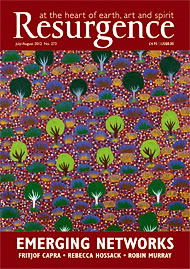If you’ve ever had a conversation about the many problems in this world and how to solve them, chances are you will eventually have bumped into the ultimate bulwark against meaningful, systemic change: an antiquated corporate model that puts profit above all other values. Whether you’re talking about climate change, resource depletion, pollution or poverty, the root cause for our collective inability to take a more equitable long-term approach to these issues seems always to hark back to an arcane provision in corporate chapters that makes companies accountable only to shareholders’ quarterly earnings.
By externalising the true cost of doing business, and eschewing responsibility for adverse social and environmental impacts, not only are corporations profiting from a rigged playing field at the expense of the commons, but they’re also being allowed to destroy the fragile ecosystem that all living beings on planet Earth depend on. In the US in particular, with its aversion to regulations and government intrusion, not only have corporations been enabled to accumulate massive wealth at the expense of the public good and the environment, but they are in fact mandated to do so by their by-laws even when it’s against the values of their officers and employees.
It’s this crucial flaw in the corporate code that Jay Coen Gilbert, co-founder of B Lab – a non-profit organisation with the mission to create a new sector of the economy that harnesses the power of business to solve social and environmental problems – has been dedicating his life to remedy. Inspired by the power of using business for good, Jay has become a driving force behind the movement to create a new legal corporate entity called a benefit corporation.
“If we want to solve our most challenging problems, we need to use the power of markets to do so,” says Jay, pointing out that three-quarters of the US economy is generated by business, and a great proportion of people’s time is spent in the marketplace. “If we don’t use the market for a higher purpose than just amassing personal wealth, we’re missing a huge opportunity, not just to do good for others, but to develop ourselves to our full potential as human beings.”
To date, benefit corporation legislation has been passed in seven US states, including California and New York. It allows corporations to register as Benefit Corps rather than the more traditional limited liability company (LLC) or C corporation (C Corp), redefining their purpose to include non-financial interests and to make a materially positive impact on society and the environment. Perhaps even more significantly, Benefit Corp status relieves a corporation from its obligation to maximise shareholder profit, thus empowering entrepreneurs to build their businesses for the longer term without being forced to sell to the highest bidder.
One of the first companies to register as a Benefit Corp in California was the outdoor clothing company Patagonia, whose sustainable business philosophy is now legally enshrined, assuring its legendary founder, Yvon Chouinard, that his company and its values will be preserved long past his own tenure. According to Jay, companies like Patagonia are part of a global movement that is redefining what it means to be a success in business, from competing to be the best in the world to being the best for the world.
In states that have not yet passed Benefit Corp legislation, companies can become Certified B Corporations through a third-party assessment conducted by B Lab that verifies the social and environmental impact of a company on an ongoing basis. In a world of endless greenwash talk and good intentions, B Corp certification is a way to tell the difference between a good company and good marketing. “It’s not just like they join a club and pay a membership fee,” says Jay. “The certification has real legal rigour in it. Whether you’re a consumer, a policymaker, or an investor looking to put your money to work, you want third-party validation of the company’s actual performance, not just their intentions. It’s a big deal.”
While all 500 or so Certified B Corporations are currently in North America, the B Corp movement is in the process of going global. In the last six months B Lab has had enquiries from a dozen countries – from South Korea to Chile to France – all wondering if they can have their businesses certified as B Corps. “You know, the idea of how we can use business for good is a global idea,” says Jay. “I think that within five years 25% of all the B Corps in the world will be outside the US.”
Jay is under no illusion that this is a fast process. “What we’re doing is slow and beautiful work. We’re not trying to slap up a bunch of McMansions to maximise the return on investment. If we were doing that we would have 5,000 B Corps by now, but we would also have lower standards. Instead, we’re building something to last. My hope is that this community of companies can inspire generations of entrepreneurs for at least the next century, before better ideas come along that replace this one.”








